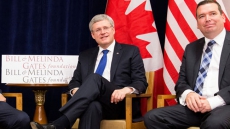Canada's broadcast regulator has issued broad new proposals that could, if adopted, dramatically alter how Canadians receive and pay for their television.
The proposals issued Thursday by the Canadian Radio-television and Telecommunications Commission include requiring cable and satellite providers to offer a basic service made up primarily of local Canadian channels — something CRTC chairman Jean-Pierre Blais calls "skinny basic."
The CRTC is also proposing a so-called pick-and-pay structure that would allow Canadians to choose individual channels, on top of a basic service.
And it suggests the price of that basic service could be capped at between $20 and $30 per month.
The proposals, which have evolved through consultations with the public and industry over the past year, will likely result in a major departure from the current TV content delivery model, Blais said Thursday in an interview.
"How Canadians consume television content, what is television content, how technology is influencing that, is so significant that I expect out of this there'll be considerable change," he said.
But at least one consumer group says the CRTC hasn't gone far enough and should allow Canadians a "pure choice."
"What store do you walk into, or anywhere else, where you're told you've got to buy certain things before you can buy what you want?" said Bruce Cran, president of the Consumers’ Association of Canada.
Consumers should be allowed to buy TV channels one at a time, without having to pay for a basic service, no matter how pared down, he said.
"It makes absolutely no sense as far as the consumers' point of view."
Still, Cran said he understands the CRTC has a mandate under the Broadcasting Act to ensure a certain amount of Canadian content, and that programming is delivered that reflects "Canadians to Canadians."
Industry Minister James Moore first indicated last October that he'd like to see more choice for Canadian television consumers.
The government then laid out its plans to overhaul the country's TV distribution system in its speech from the throne, which included a proposed "pick-and-pay" service structure.
Other proposals unveiled Thursday include requiring service providers to offer build-your-own channel packages or allowing them to continue offering the same packages that are currently on the market.
"(Service providers) would be required to allow subscribers to build their own custom packages of discretionary programming services," the CRTC said in a table incorporated in a new notice of hearing.
"(Service providers) could still offer pre-assembled packages."
At the same time, the regulator proposes allowing local TV stations to shut down their transmitters — a move that might not sit well with consumers who prefer to get their TV programming over the air.
"It's an idea that we want to explore," said Blais, who stressed that the proposal is open for debate.
Roughly eight per cent of Canadian TV viewers get their content using antennas, without paying a service provider to deliver programming.
The CRTC also proposes allowing television stations and networks to count revenues from online or other delivery platforms toward their overall revenue base.
The regulators says it has not yet decided which options it will enforce, and is giving the public until Sept. 19 to offer comments on the proposals online.
A public hearing will also be held Sept. 8 in Gatineau, Que.
A number of companies, most of them in eastern Canada, already offer basic service plans and "pick-and-pay" options.
But some service providers have said they need the ability to rework contracts with television program suppliers if the CRTC wants true "pick-and-pay" pricing for consumers.
The regulator touches on that in its notice, proposing that program suppliers be banned from demanding "unreasonable penetration-based" rates for their programming.
In the end, Blais said that while consumers should benefit from more choice through the changes, they will have to pay something for the services they receive.
Otherwise, he said, the programs they want simply would not exist.
"You have to, to a certain degree, be concerned about the underlying economic model," said Blais.
"Canadians love to have that great content, but it still has to be made and paid for."
Once new regulations are adopted, the CRTC said it expects them to come into force by December 2015.





